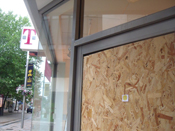Wide-ranging reforms are wanted to prevent future disorder. That’s according to the Riots Communities and Victims Panel set up by the main political parties to report on the August 2011 riots. The looting and arson is reckoned to have lost the economy half a billion pounds.
The independent Panel set up to explore the causes of the riots in England last year has presented its final report to the Prime Minister, Deputy Prime Minister and Leader of the Official Opposition. The report makes public policy recommendations which the panel argue must be enacted together, to ensure the risk of future riots seen on the scale of last August can be significantly reduced.
The cross party panel’s findings are based on research in communities, and consultation with third sector organisations and social enterprises, local authorities, and private sector employers. For the 24-page summary and the 148-page full report, visit http://riotspanel.independent.gov.uk/.
Many people the panel spoke to shared a concern about a lack of opportunities for young people, poor parenting, a lack of shared values and sense of responsibility among some, an inability of the justice system to prevent re-offending, concerns about brands and materialism and issues relating to confidence in the police.
The wide ranging issues and recommendations tackled in the final report include:
* Families aren’t getting the support they need. The Panel supports the Government’s Troubled Families Programme, but found that the overlap with rioters is limited. Government and local public services should develop a strategy incorporating the principles of the Troubled Families Programme to help 500,000 ‘forgotten families’ turn their lives around.
* Communities told the panel that young people need to build character to help them realise their potential and to prevent them making poor decisions, like rioting. Schools should assume responsibility for helping children build character.
* Children are leaving school unable to read and write – one fifth of school leavers have the literacy skills of an eleven year old, or younger. Where schools fail to teach children to read and write they should pay a financial penalty, used to help the pupil ‘catch up’.
* Communities and young people told the panel that having a job is key to people feeling that they have a stake in society. Government and local public services should fund together a ‘Youth Job Promise’ scheme to get young people a job, when they have been unemployed for a year.
Darra Singh Chair of the Riots Communities and Victims Panel said: “We must give everyone a stake in society. There are people ‘bumping along the bottom’, unable to change their lives. When people don’t feel they have a reason to stay out of trouble, the consequences for communities can be devastating – as we saw last August.
“The causes of the riots were complex and there is not one thing that will prevent them from happening again. But enacted together, our recommendations address the underlying reasons why up to 15,000 people across the country became involved in some of the most significant disturbances we have seen.
“We urge party leaders to consider the importance of all of our recommendations. Should disturbances happen again, victims and communities will ask our Leaders why we failed to respond effectively in 2012.”
The panel’s Neighbourhood Survey was conducted by IPSOS MORI in six neighbourhoods – four where many rioters came from, and two of similar levels of deprivation, which did not riot. The neighbourhoods where rioters came from were in London, Manchester, and Birmingham. The similar neighbourhoods were in Newcastle and Luton. Up to 15,000 individuals actively participated in the riots, with countless more bystanders observing. Some 5000 crimes have been recorded in relation to the riots. Five people died. The majority of rioters were under 24. Most of these young people had poor academic records. Nine out of ten were known to the police and a third had been in prison. Some 70 per cent of those arrested came from the 30pc most deprived areas.










